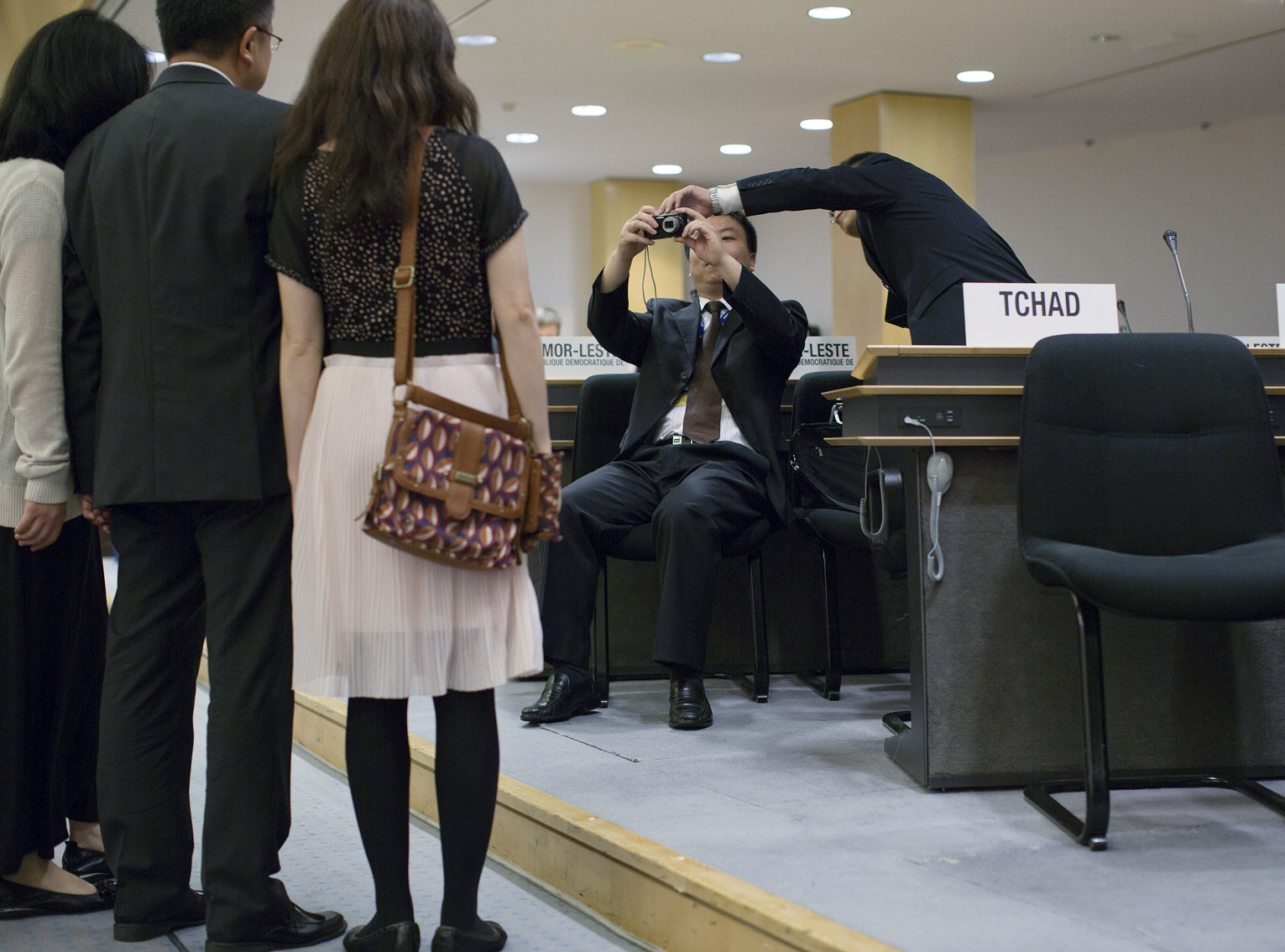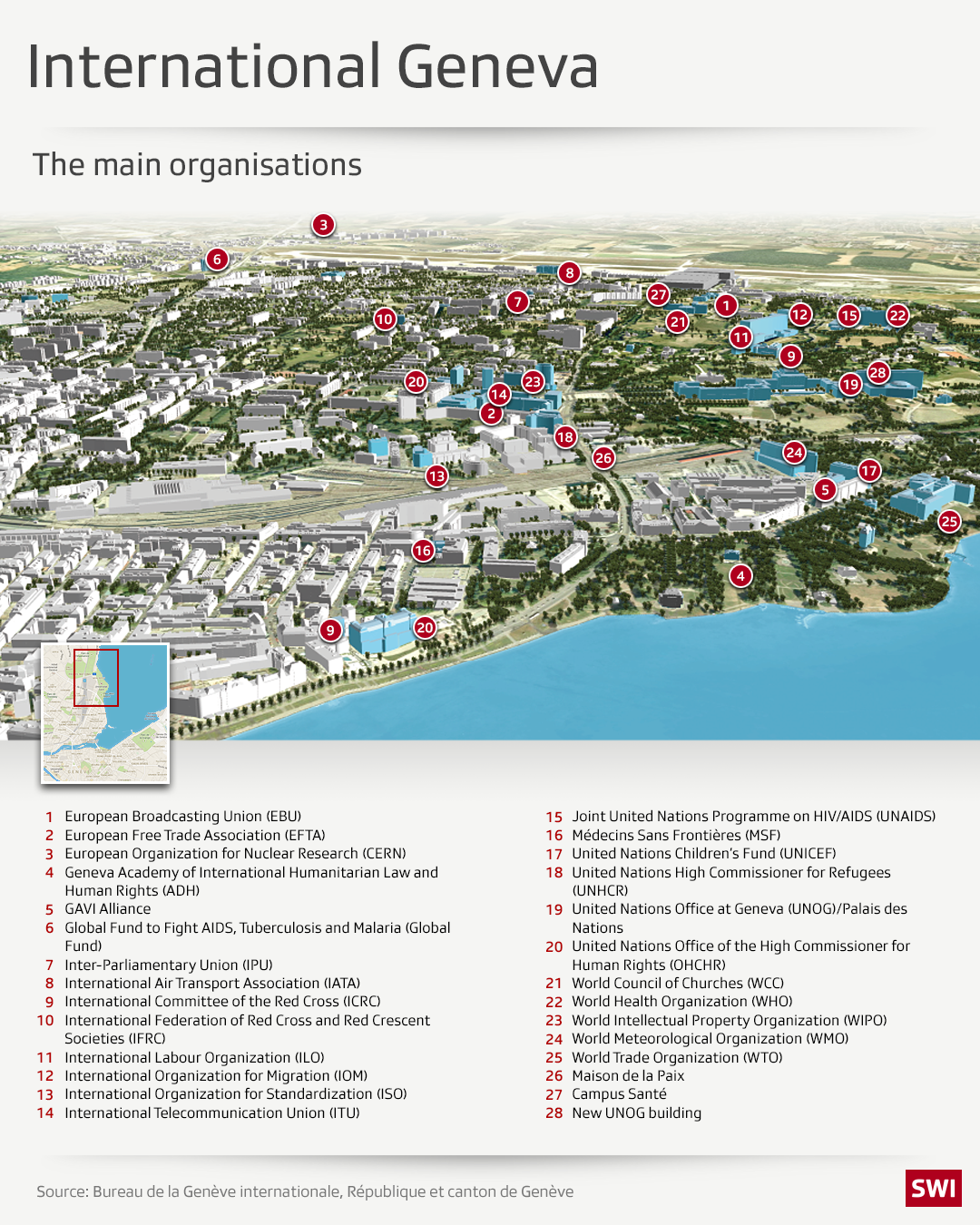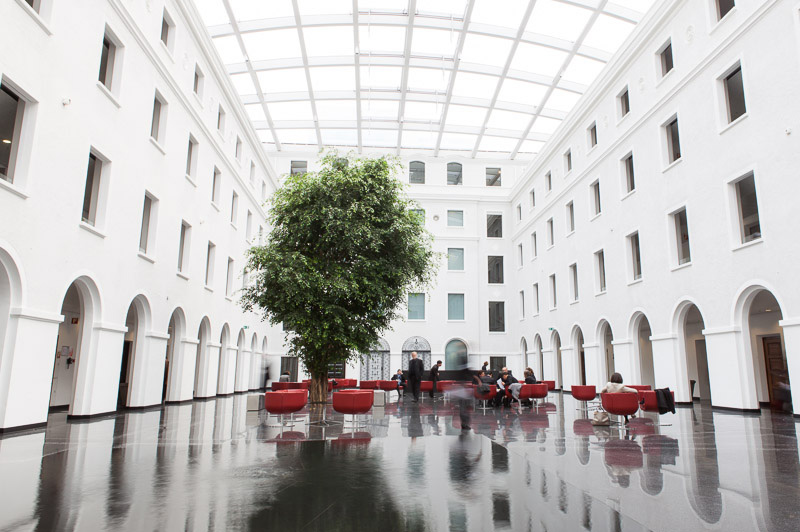Swiss seek to boost city’s intellectual impact

International Geneva is witnessing a flurry of ‘intellectual’ initiatives that the Swiss authorities hope will help strengthen its long-term attractiveness to fend off stiff international competition from cities like Copenhagen and Abu Dhabi.
After five years’ design and construction work, the first two ‘petals’ of the Geneva Graduate Institute’s new state-of-the-art campus are set to be officially opened on September 26 when former United Nations Secretary General Kofi Annan, an ex-student, gives the inaugural lecture.
The CHF200-million ‘Maison de la Paix’ is not the only big new project of its kind in Geneva. A new conference and networking hub has been opened next to the Red Cross Museum. And in a few years’ time, a ‘Centre for Global Cooperation’ is planned to play host to its first behind-the-scenes talks.
Whether these projects are enough to keep Geneva the most international of world cities is an open question. But the federal authorities and canton Geneva are betting on it. They hope the Maison de la Paix becomes a reference centre for peace, security and development matters. The bigger objective is to strengthen the attractiveness of Switzerland as a host state in the face of growing international competition (see freeform).
It’s the kind of competition recently described by political scientist Daniel Warner in his blog in the Tribune de Genève newspaper.
“Renovations of buildings to house international organisations is necessary to keep International Geneva thriving…other cities are and will try to attract organizations away from Geneva with seductive offers for relocation. There is real competition. The high living costs in Switzerland, the strong franc and improved telecommunications have made Geneva less competitive.”
The “International Geneva and its Future” report outlines the ever-tougher competition to host organisations among cities such as Montreal, the Hague, Bonn, Vienna, Budapest, Abu Dhabi, Manila and Copenhagen.
Since 2008 there have been some 21 partial delocalisations (mostly humanitarian, human rights and migration sectors) from Geneva and 18 installations (mostly environment and sustainable development) in the city.
The main delocalisation destinations were New York, Copenhagen, Brussels, Paris, Turin, Budapest, Istanbul, Manila, Kuala Lumpur, Bangkok and Nairobi. Their activities are essentially administrative, IT, logistics and finance related; the main reasons for moving from Geneva are to reduce costs, but also to be closer to the field.
Yves Daccord, the director general of the International Committee of the Red Cross (ICRC), recently downplayed a Swiss TV news report that said the ICRC was moving part of its 900 headquarters staff abroad to places like Manilla due to financial pressures. “Delocalisations are a small element of our global strategy,” he declared.
Source: the “International Geneva and its Future” report/swissinfo.ch
The future
Warner added that Geneva’s intellectual development was crucial, an aspect outlined in the Government’s recent strategy document titled, “International Geneva and its Future”, which details the need to develop the city’s ‘intellectual’ strengths as well as infrastructure projects.
One of the leading projects is undoubtedly the Maison de la Paix, a spectacular glass building with a unique design in the form of six petals. The first two will house the modern new home of the international and development studies institute, bringing together the 85-year-old institute’s teaching, research and administrative activities and 850 students scattered across town.
Petals two, three and four will be home to the Centre for the Democratic Control of Armed Forces, the Geneva Centre for Security Policy, and the Centre for Humanitarian Demining, which are all supported by the Swiss government. Petals three and four will be completed at the end of the year, and the last two housing other peace, development and security-related organisations in the middle of 2014.

More
Behind the scenes in Geneva
Strategic position
The Maison de la Paix is located in the heart of the International Geneva district close to the European UN headquarters.
“Having everyone together under one roof will create a tremendous intellectual dynamic,” said institute director Philippe Burrin, adding that it has one of the highest concentrations of PhD students in Switzerland.
This, he said, should help Geneva attract world-class researchers and teachers, but couldn’t say if it would prevent organisations from moving elsewhere.
Xavier Comtesse, a director of the Avenir Suisse think tank who has advised on International Geneva issues, expressed doubts about the Maison de la Paix project.
“The proximity is ok, but I wouldn’t get too excited. There is no think tank component which disappeared from the initial plan. They are just looking at the building and not its content,” he declared.
‘Centre for Global Cooperation’
But the Maison de la Paix is not alone. The ‘Humanitarium’, a hi-tech conference and networking hub for the humanitarian community, was inaugurated earlier this month by the Swiss government and the International Committee of the Red Cross (ICRC).
Another major initiative in the new Swiss host strategy is the ‘Centre for Global Cooperation’ planned at Geneva’s Château de Penthes complex, currently home to the Museum for the Swiss Abroad.
The CHF50 million project by the Graduate Institute and the University of Geneva is designed to help position Geneva as a “place of reflection and expertise on global questions”.
Burrin said the centre’s name was misleading, as the idea was to create a place like Wilton Park conference centre in Britain that could play host to closed-door international negotiations and arbitration as well as expert seminars. The new complex is unlikely to open before 2020.

More
Mapping Geneva’s international organisations
“Cold War is over”
Former Swiss ambassador François Nordmann praised the idea.
“General reflection on the future of international organisations, their role and importance is missing. This is something Switzerland needs to get involved in to help reform the UN system,” he commented.
But Comtesse questioned whether there was a real need for a place for international arbitration and negotiation in Geneva, and said Geneva should sell itself more as a centre for global governance and regulations.
“The Cold War is over,” he declared. “But a ‘Global Governance Café’ at Penthes – why not?”
Burrin said there were rumours that former World Trade Organisation chief Pascal Lamy was interested in heading up a think tank at Château de Penthes.
He said Switzerland was ‘right to be ambitious’, but he felt the idea of a think tank was unrealistic – too expensive and did not match Switzerland’s foreign policy ambitions.
“No one is going to give the money for a think tank in Geneva. Just look at the competition in New York, London and Brussels,” said the director.
Geneva is home to the headquarters of 32 international organisations, such as the World Health Organization, the World Trade Organization and the International Committee of the Red Cross.
In all, some 26,000 international diplomats and civil servants are based in Geneva; in addition there are around 2,400 staff working for 250 non-governmental organisations. Around 9,400 staff work for the United Nations family in Geneva, which is the largest concentration of UN personnel in the world. There are also 172 states represented by permanent diplomatic missions to the UN.
Annually, Geneva is host to the largest number of international conferences and meetings – 2,700 – ahead of New York, welcoming 200,000 people. In addition, there are 3,000 professional and private visits by heads of state, government and ministers. Some 900+ multinationals are also registered in Geneva, providing over 76,000 jobs.
Source: the “International Geneva and its Future” report
Play to strengths
With profound changes in global governance underway, the Swiss say they recognise that International Geneva has to play to its strengths to maintain its position.
“One of the characteristics of the modern world is that states no longer have a monopoly on international relations. Finding responses to most global challenges – whether it is pandemics, the environment or cyber security – require calling upon many different actors, states, NGOs, academics or specialists,” said Swiss Ambassador to the UN in Geneva Alexandre Fasel.
“We need a host policy for international organisations that is not only active and effective but which also emphasizes the true value of the resources here in Geneva – the concentration of brainpower and actors who really matter in global governance today.”
Encouraging “intellectual exchange’ and synergies and building stronger networks among the thousands of foreign officials, civil servants, NGOs, academics and other specialists based in the city is key, say Swiss officials.
A recent study commissioned by the Swiss authorities found that despite the extremely high concentration in Geneva of the most important global cooperation players, links between organisations and collaboration across fields of activity were weak.
“Buildings are necessary but not sufficient to keep Geneva as the capital of multilateralism,” said Warner. “The competition between Geneva and other cities is about ideas, not just material comforts.”
(with input from Frédéric Burnand)

In compliance with the JTI standards
More: SWI swissinfo.ch certified by the Journalism Trust Initiative














You can find an overview of ongoing debates with our journalists here . Please join us!
If you want to start a conversation about a topic raised in this article or want to report factual errors, email us at english@swissinfo.ch.